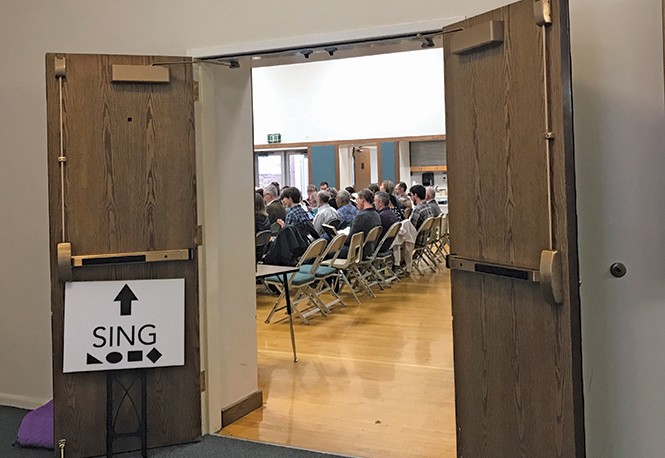Joined Voices
Sacred Harp unites singers of all kinds in beautiful vintage songs.
By Erin Moore @errrands_Sacred Harp seems somewhat of an odd name for a company of a capella singers—until one realizes that "sacred harp" is an old reference to the human voice, one's own God-given instrument. It's this simple foundation—the common nature of singing—that is the glue for a vocal tradition that finds a home all over the country, including Utah. I recently visited two all-day events called singing over a weekend in late September where for the first time in about 15 years, the local Sacred Harp community played host to singers from around the U.S.
The first part of the weekend started at the Cathedral Church of St. Mark's where I found my friend and Provo-based musician and producer Bly Wallentine working the welcome table. They were singing along by the door, while in a large circle under the steep, stained-glass-dotted ceiling, a group of more than 100 people filled the air with sweet, voluminous harmony. They sang songs from the book Sacred Harp—where they get their name—which is a compilation of early American hymns made up of a simple system of four music shapes sung as "so," "fa," "la" and "mi." This shape note singing is a halved version of traditional solfege meant to make sight-reading easy for folks unfamiliar with musical notation. At the end of the performance, Wallentine recommended I go to the Sunday singing, and that I did.
I arrived early, this time at a Liberty Wells LDS stake, and soon was talking with Lynn Carson, who turned out to be one of the early members of the group, participating since about 1999. Carson explains Sacred Harp as such: "People either love it or they don't." For his part, he did at 16, falling for an organ variation on a shape-note tune called, fittingly, "Wondrous Love." He also tells me about the Latter-day Saints of the 1830s, who wrote their own hymns in the early American style, and whose efforts can be found in Sacred Harp today. Despite all his interest, though, it wasn't until the new millennium that a group for singing Sacred Harp would emerge.
But emerge it did. Even at this smaller Sunday gathering, the room was packed with people. One young man from Boston, despite having no musical experience before Sacred Harp, and having only been at it for a year, had already been to singings up and down New England, and one in Europe. A woman from Berkeley, Calif., Leah Coffin, started with the group because of a New Year's resolution to try new things. My former undergraduate English professor, Chris LeCleuyse—who is also part of local Renaissance revivalists Utopia Early Music—was there. Conversations with these people occurred in the recesses between the music, 45-ish minute chunks of astounding, beautiful riots of song. I was so inspired, I tried to conjure my own sight-reading skills from their teenage grave, to poor avail.
As things wrapped up, I found the coordinator for the event, Evelyn Lamb, whose own history with Sacred Harp spans her time in many cities. Wherever she happens to be, Lamb finds comfort in being able to drop in at any of the casual weekly singings various cities host. (SLC's own schedule can be found at utahsacredharp.org).
Since she's not one for small-talk, the tight-knit and welcoming Sacred Harp community is her preferred way for finding friends. "This can be an emotional experience, singing together," Lamb says. "I think it causes people to form friendships quickly, and at a deeper level than you might with some other activities. ... When someone is sick, people will often say, 'Hey, I want to sing this song tonight for [them].' If you hear of a singer in another city who's died, and you know their favorite song, you lead that at your singing that night to remember them." As we speak, she says goodbye to the visitor from Boston—a brief goodbye, because the following weekend, she's bound for his city's singing event.
Among those who brought Sacred Harp to Utah are Jenny and Stan Jenson and their friend Karen Willard. Along with other friends, they started singing around one little table, with one person singing each of the four parts. "I don't think we've ever had to cancel singings, ever, in 20 years," Jenny Jenson says. Stan credits the fixity of their schedule and location: "When people are free they come. ... Some people are there every time, some people pop in on us while travelling."
Willard notes that the draw, at the end of the day, is the freedom, describing how in the past, Calvinists and Evangelicals had to agree to disagree and leave their differences at the door because they "had to be able to get along, because we need each other to sing."
During a brief exchange with a Nebraska-based Jewish singer, Ben Fink, about religious ideologies and singing, another singer stepped in on our conversation, saying of Sacred Harp, "Well see, here's the strength: It proposes that you can just as easily build a functional and tight-knit community based on what you can do together. In these times, I think that's really radical."
More by Erin Moore
-
The Granary, The Florist and the theme park-ification of Salt Lake City
Opinion
- Mar 13, 2024
-
Salt Lake City's dense, walkable spots are great for business—if businesses can find one
Small Lake City
- Feb 14, 2024
-
Dating counselors help singles move past relationship hiccups and get to the next date.
Looking for Love
- Feb 7, 2024
- More »
Latest in Music
Readers also liked…
-
The Alpines Head North
Local band's debut concept album finds musical bliss in the apocalypse.
- Feb 7, 2024




